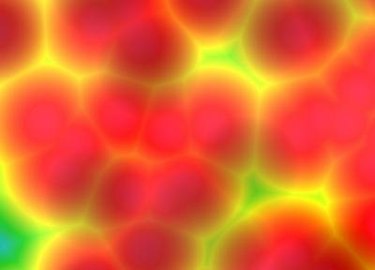
Your cells depend on adequate intakes of several nutrients to stay healthy. These nutrients come from a variety of foods in each food group. and the best way to be sure you are getting the daily recommendations for each is to eat a well-balanced diet. You may also want to include a supplement under your doctor's recommendation if you are having trouble getting enough.
Protein
Video of the Day
Protein plays a large role in cell growth and repairs damaged cells as well. Most Americans get enough protein every day, but a deficiency could result in health problems having to do with your skin, hair, nails, blood, organs and muscles. Protein comes from animal products, including beef, chicken, fish, pork, eggs and milk. Beans, peas, nuts, seeds and corn are plant products that contain protein. Your protein intake should make up 10 to 35 percent of your daily calorie intake, according to the U.S. Department of Agriculture's Dietary Guidelines for Americans 2010. For a 2,000-calorie diet, this equates to 50 to 175 g of protein each day.
Video of the Day
Iron
Iron is a nutrient that builds healthy red blood cells, and a deficiency could result in feelings of weakness or fatigue, otherwise known as anemia. Foods that are rich in iron include, beans, beef, chicken, shrimp, peas, dried fruit, potatoes, spinach, whole grains and tomato juice. Adult women between the ages of 18 and 50 need 18 mg of iron each day, while older women and men should aim to get 8 mg daily. If you are pregnant or breastfeeding, your doctor may recommend a supplement to help you get additional iron to support your baby.
Vitamin B-12
Vitamin B-12 supports the formation of new red blood cells and is only found in animal foods. If you are a vegan or vegetarian, you will likely need to take a vitamin B-12 supplement for this reason. It is found in eggs, meat, chicken, shellfish and milk products. Adults need 2.4 mcg of this B vitamin each day to support healthy cells within the blood.
Antioxidants
Antioxidants are present in many foods, and they fight the free radical damage that occurs through exposure to environmental toxins and a poor diet, both of which damage cells and increase the risk of health problems that include cancer and heart disease. Fruits and vegetables are a good source of antioxidants, and a diet rich in them is associated with a lower incidence of these diseases. Other good sources include dark chocolate, red wine, beans, whole grains and fish. A well-balanced meal plan offers a good dose of antioxidants to support healthy cells in all parts of your body.